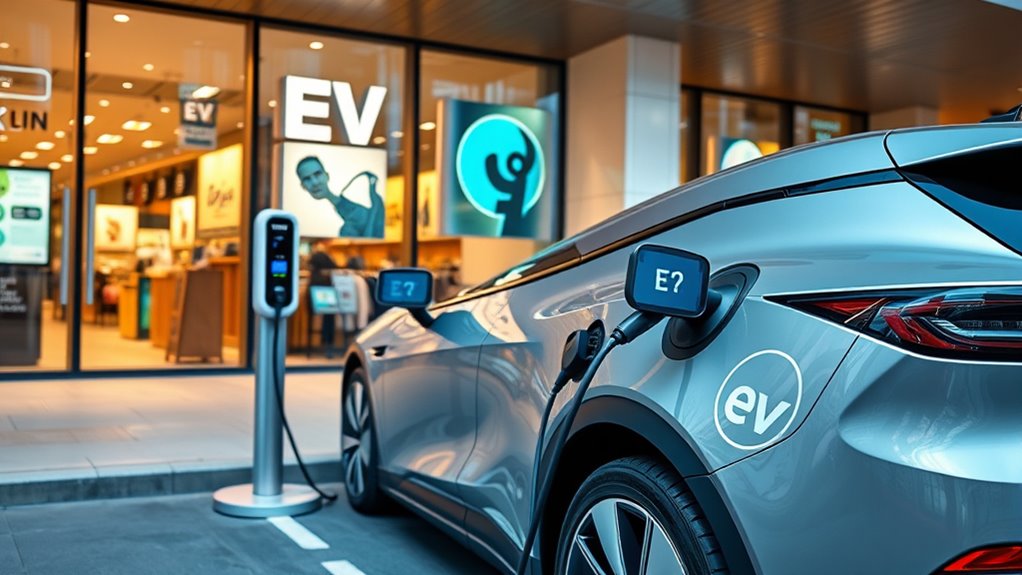To support the rising adoption of EVs, your shop needs the right charging infrastructure, including Level 2 and fast chargers, along with a skilled team familiar with high-voltage safety protocols. Ensuring your technicians can diagnose and repair both hardware and software issues is vital. Updating tools and safety procedures positions your business to attract customers seeking expert EV services. Keep exploring to discover how to make your shop fully prepared for the EV revolution.
Key Takeaways
- Upgrading charging infrastructure and providing technician training ensure repair shops are prepared for increasing EV adoption.
- Familiarity with hardware and software systems enables effective diagnostics and maintenance of EV charging components.
- Implementing safety protocols for high-voltage systems protects technicians and ensures compliance during EV repairs.
- Partnering with educational programs keeps staff updated on evolving EV technology and best practices.
- Investing in tools, infrastructure, and training positions shops as trusted experts, attracting EV customers and maintaining competitiveness.

As electric vehicle (EV) adoption accelerates, automotive shops must evaluate their readiness to service these new technologies. One of the most critical areas to consider is charging infrastructure. Unlike traditional vehicles, EVs rely heavily on accessible and efficient charging stations. If your shop isn’t equipped with knowledge or tools related to charging systems, you risk falling behind as more customers seek maintenance and repairs for their EVs. You should start by understanding the different types of chargers—Level 1, Level 2, and DC fast chargers—and how they integrate into a vehicle’s electrical system. Knowing how to troubleshoot charging port issues, diagnose wiring problems, and perform software updates related to charging infrastructure will set your shop apart. Your technicians need to be familiar with the hardware and software components involved in EV charging, so they can accurately diagnose problems and recommend appropriate solutions to customers. Additionally, understanding how high-voltage systems operate safely is essential for preventing accidents and ensuring proper handling during repairs.
However, establishing a robust charging infrastructure isn’t just about physical equipment; it’s equally about technician training. As EV technology advances, the complexity of systems increases, making continuous education essential. You must ensure your team has the skills to handle high-voltage systems safely and efficiently. Training should cover proper safety protocols for working with high-voltage batteries, including disarm procedures and PPE requirements. It’s also crucial to understand the intricacies of EV electrical systems, battery management, and regenerative braking systems. The more your technicians learn about these components, the better equipped they’ll be to perform diagnostics, repairs, and preventive maintenance.
Investing in technician training benefits your shop by boosting confidence and safety, which translates into better service quality. Many manufacturers and training providers now offer specialized courses tailored to EV technology, so take advantage of these resources. You might also consider partnering with local technical schools or industry organizations that focus on EV systems. As the EV market grows, staying ahead means not only updating your tools and infrastructure but also ensuring your staff is knowledgeable and confident working with these vehicles. This proactive approach will help you attract more customers who are seeking expert repairs and maintenance for their electric cars.
Frequently Asked Questions
What Incentives Are Available for EV Shop Upgrades?
You can access government grants and tax credits to upgrade your EV shop. These incentives help offset costs for installing fast chargers, energy-efficient equipment, and safety upgrades. By taking advantage of federal and state programs, you reduce your investment and improve your shop’s readiness for electric vehicle servicing. Check local resources to find specific grants and credits available in your area, and guarantee you meet the qualification criteria to maximize your benefits.
How Do Charging Station Types Vary for Different EV Models?
While it’s wise to consider charging station compatibility, different EV models often require specific charging options. Level 2 chargers suit most vehicles, but fast chargers may be necessary for longer trips. Charging infrastructure standards help guarantee seamless compatibility, but some models might need specialized stations. To avoid surprises, check your EV’s charging port and manufacturer recommendations, making sure your station meets the appropriate standards for ideal performance and convenience.
What Safety Protocols Are Recommended for EV Shop Staff?
You should always follow EV battery safety protocols by wearing appropriate personal protective equipment, like gloves and eye protection. Make sure your shop staff are trained to handle batteries carefully, especially during maintenance or emergencies. Keep fire extinguishers nearby and avoid exposing batteries to extreme heat or punctures. Regularly review safety procedures to prevent accidents and guarantee everyone’s well-being while working with EV batteries.
How Can Shops Forecast Future EV Adoption Trends?
Think of forecasting EV adoption trends like sailing into uncharted waters—you need a steady hand and a good compass. To do this, analyze current market penetration and observe shifts in consumer behavior. Keep an eye on industry reports, government incentives, and technological advances. Combining these insights helps you predict future growth, allowing your shop to prepare for increased demand and stay ahead in the evolving EV landscape.
What Training Is Necessary for Technicians to Service EVS?
You need to provide technicians with training on EV battery safety and high voltage troubleshooting. This includes understanding proper handling, safe disconnection procedures, and emergency response protocols. Hands-on practice with high voltage systems guarantees they can diagnose and repair issues confidently. Additionally, training should cover current regulations, insulation testing, and the use of specialized tools to keep both technicians and customers safe during service.
Conclusion
Getting your shop ready for EV adoption is like planting a seed for the future—your efforts today will blossom into a thriving, sustainable business tomorrow. By embracing the changes now, you set the stage for success in a rapidly evolving market. Stay proactive, adapt quickly, and watch your shop grow into a beacon of innovation. The road ahead may be winding, but with preparation, you’ll navigate it smoothly, steering confidently into a cleaner, brighter future.









